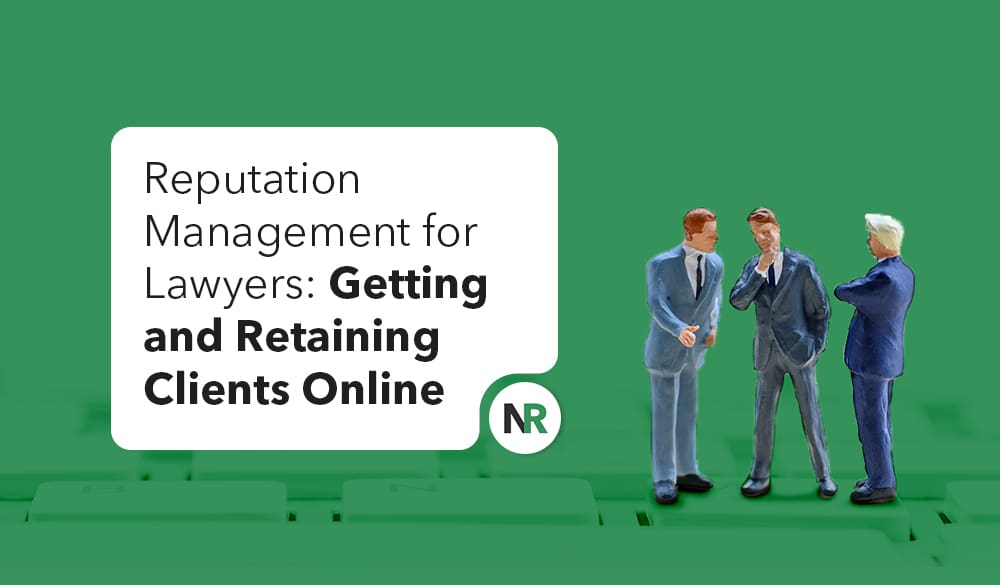If your law firm could use a boost online, our experts can design customized reputation management for lawyers to attract more potential clients.
Today, most people search online to find a lawyer — they aren’t talking to the bar, asking their friends for recommendations, or going through the Yellow Pages. That means that online reputation management for lawyers and law firms is an undeniable necessity.
Lawyers need to make sure their reputation speaks for itself when it comes to Google Search, review sites and social platforms.
That’s no easy task. Law firm reputation management involves a lot of strategies, including:
- Monitoring the online presence of your law firm
- Managing online reviews and review sites
- Regularly creating high-quality content
- Optimizing your website and content to attract potential clients
- Engaging with your audience on social media
- Communicating with clients directly and via marketing
- Monitoring the competition to give yourself an advantage
- Handling any crisis that arises
Building a strong online reputation for your law firm or for an individual lawyer is a full-time job all on its own. In this article, we’ll go over must-know law firm reputation management strategies. If you want to discuss your law firm’s online reputation with an ORM expert, call us today at 844-461-3632 or fill out the contact form below.
Request a Free Consultation
What Is Reputation Management for Lawyers?

Law firm reputation management refers to the strategy of controlling the information that’s presented to the public about a lawyer, law firm or other type of law practice.
Today, it’s most common for a business’ or individual’s reputation to be digital. What someone sees about a lawyer online is going to influence their perception of that lawyer in real life. Proper reputation management puts you in a positive light online.
When people search for information and stories about a lawyer, ORM can ensure that they’ll find positive reviews, anecdotes, press releases, and other types of flattering and neutral content instead of negative content. When people do find negative information online about the lawyer, ORM can present information that counters that negative information so it’s less impactful.
Law firm reputation management has a significant impact on a lawyer’s ability to accrue new clients. Even when a client refers your legal services to another client, they are still likely to look you up online.
In fact, people are increasingly relying on the internet to make all of their decisions. The better your reputation is online, the better your chances are of building your new clientele and ensuring you have satisfied clients.
Perhaps most importantly, law firm reputation management is most effective when you get on top of it early on. If there isn’t a lot of information about you on the internet because you haven’t yet built up your reputation online, it’s easier to build and maintain a positive reputation than to fix a poor one.
However, once there are negative stories on the internet, they tend to proliferate. A single negative review can be copied to dozens upon dozens of legal sites and platforms that gather online reviews. This can be far harder to counter if you wait to deal with it.
If you have poor client reviews and want to stop the damage to your reputation in its tracks, contact NetReputation today at 844-461-3632.
Why Are Negative Client Reviews So Damaging?

Potential clients are likely to read reviews about your law firm online before deciding whether or not you’re right for their legal needs.
In fact, people around the world rely on online reviews to make purchasing decisions, regardless of the industry. These reviews are trusted as much or more than personal recommendations by friends and family.
Poor reviews not only hurt your reputation, but they also put your financial security at risk. Bad reviews erode the trust you have between your firm and your clients. Potential new clients confronted with negative reviews are likely to avoid your firm altogether, effectively pushing those new clients to your competitors.
Can you afford to miss out on new clients because poor reviews are standing in your way?
5 Tips to Improve Reputation Management for Lawyers
Reputation management for lawyers begins with a thorough understanding of how the internet works. While there’s no way to 100% delete damaging information from the internet, there are online reputation management services that limit how much it’s seen.
Here are a few of the most common techniques used to improve reputation management for lawyers. To speak with an expert who can create a custom law firm reputation management plan for you, call us at 844-461-3632.
1. Push Good News Up and Bad News Down

Since you can’t delete information from the internet, the most common technique for improving reputation is to instead push up good and neutral information. In other words, release articles, blog posts, and press releases that speak about your firm or practice in a positive light.
If these articles, posts, and releases can outrank the bad information online, they’ll be the first thing that people see.
Google always tries to deliver information that is most relevant to the person who’s searching. If a prospective client searches for [your firm] reviews, Google will try to deliver the page that is most applicable. If that’s a negative review, they will see the negative review first.
However, if you’ve made sure that there are tons and tons of positive reviews out there, it’s far more likely that the user will see those positive reviews first. Plus, people are very unlikely to go digging around past page one of Google, so they may never find the poor reviews at all.
2. Respond to Negative Reviews

There will always be bad reviews about a business. Most people know that. When people see negative feedback, what they’re really looking for is the company’s response to it.
It’s best to always talk to people about their poor experience with your law firm. Respond professionally and courteously to try to solve their problem.
You don’t have to accept fault on a public forum, especially if it could damage your lawyer reputation further. However, you can publicly reply, apologize for their experience, and ask them to contact you privately to sort out the issue.
When potential clients see how your law firm responds to problems like this, they’re more likely to trust you because they know they won’t be ignored. In this way, poor reviews don’t have to harm your law practice, and they can even give you the opportunity to appeal to future clients.
Furthermore, some reviews may be erroneous or put up by a competitor with the intent to harm your law firm. When reviews are false, you can petition to have them removed. Either way, it’s important your reputation management for lawyers strategy addresses them quickly.
3. Create a Personal Brand

Your brand tells people what to expect from you. When they know what to expect, confusion and disappointment are far less likely.
Reputation management goes beyond mitigation and damage control. It also helps you shape your personal brand and organizational identity.
Often, the best reputation management happens before a lawyer reputation has been affected at all or even before their reputation has been established.
In other words, you can control your brand reputation and your narrative by prioritizing reputation management for lawyers early on.
You can determine how you want to present your organization, how you want to interact with your clients, and the tone that you want to use in your marketing and messaging.
4. Provide the Best Customer Service

Customer service can absolutely be the determining factor when improving your law firm or lawyer reputation. Simply asking your clients how they feel about your services, whether there is anything they need, and whether there is anything they want to discuss can prevent negative feedback online.
Usually, people go online to air grievances because they feel that they haven’t been heard. Even if the client is ultimately right, their complaints could be tremendously damaging if they are posted online for the public to see.
You have a vested interest in identifying potentially disgruntled clients early on and mitigating the problem. It’s usually possible to do this by talking to them, listening to them, and finding out what they need.
Of course, it’s impossible to make everyone happy all the time. There are going to be angry customers, regardless of how positive your law firm reputation is.
That’s where responding to bad reviews comes in. For the most part, if someone is being unreasonable, other people will see that they are being unreasonable, too, without you needing to call it out.
If you’re not sure how to improve your customer service, getting feedback as frequently as possible is a smart first step.
As a lawyer, you can conduct an exit interview or survey to ask about their experience. Also, consider periodic check-ins to make sure they’re still satisfied with the services they received.
5. Engage on Social Media

People tend to view businesses more favorably once they’ve interacted with them one-on-one. When it comes to your law firm and lawyer reputation, maintaining social media accounts and engaging directly with potential clients can help.
Social media is highly visible and public. Even if you are responding to someone who will never be a client, your responses can be seen by prospective clients. This gives everyone a better sense of your personality and brand, as well as what you can do for them.
Take a look at other service-oriented industries. It’s not a surprise that those professionals continually engage with their customers.
Attorneys have extremely busy and demanding schedules. It’s easy to be brief with clients, especially when you know you’re supporting them to the best of your ability. However, the client may need more attention, and improving your approach can make a big difference. Using social media is a great way to offer dedicated support to your audience.
5 Common Reputation Mistakes Law Firms Make

When handling your lawyer reputation on your own, avoid these common pitfalls that many legal professionals make. The following mistakes can make it harder to get on top of your ORM strategy.
1. Trying To Remove Information Quickly
This invokes the Streisand Effect: The harder you try to get something taken down, the more likely people are to talk about it and share it. That’s why the worst information should be ignored, avoided, and pushed down rather than taken down entirely.
2. Focusing On Lawyer Reputation Management Too Late
Every professional needs reputation management. Lawyer reputation management should be something that is immediately sought out. The earlier reputation management begins, the more effective it will be.
3. Striving for a Perfect Reputation
You shouldn’t try to get rid of all negative content and reviews out there. Companies are flawed, and clients understand this. Clients will be wary of a perfectly sterling reputation. They want a genuine picture of your lawyer reputation, so don’t try to trick them.
4. Ignoring Useful Reputation Management Tools
The world has changed. People are going digital. They’re spending more time on social media sites, review sites, and more. Reputation management goes far beyond press releases and other traditional methods of media, utilizing social media accounts, emails, newsletters and other digital strategies.
5. Arguing With Clients
No one wants to see a client being dismissed or mistreated by their lawyer or law firm. Clients don’t have a way of knowing whether you’re telling the truth or a negative review is telling the truth, but they’ll have a low opinion of you if you try to quash all conversation about it.
Creating an Effective Reputation Management for Lawyers Strategy
What do you find online when you look for your firm or Google your name? Do positive reviews come up, or are you faced with an onslaught of negative information? Are there any results at all, or is your online reputation pretty much missing?
The best way to deal with your reputation management is to get ahead of it. The sooner there are positive pieces of content posted about your practice, the less likely it is that negative content will gain traction.
Additionally, the experts at NetReputation know exactly how to handle poor reviews, negative articles and PR crises in order to restore your reputation and secure a successful future.
If you’re ready to get started, call us today at 844-461-3632 or fill out the contact form below.
